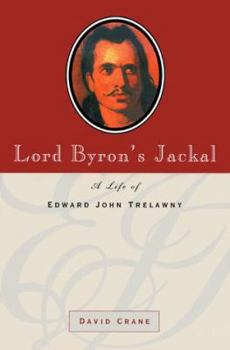Lord Byron's Jackal: A Life of Edward John Trelawny
Select Format
Select Condition 
Book Overview
As David Crane writes in Lord Byron's Jackal, "It is given to few men to kill two major poets." As a hanger-on of the Romantics, Edward Trelawny designed a boat for Percy Bysshe Shelley that... This description may be from another edition of this product.
Format:Hardcover
Language:English
ISBN:1568581432
ISBN13:9781568581439
Release Date:January 1999
Publisher:Four Walls Eight Windows
Length:398 Pages
Weight:1.75 lbs.
Dimensions:1.4" x 6.4" x 9.3"
Customer Reviews
2 ratings
Thrilling and Full-Blooded
Published by Thriftbooks.com User , 21 years ago
In his book "Adventures of a Younger Son," Edward Trelawny set down the facts of his youth as he had told them for years: how as a teenage midshipman he began his adventures by breaking the skull of his commanding officer and deserting into the pirates' paradise of the Java Sea; of Zella, his fawn-like, thirteen-year-old bride; fearless, bloody years of piracy and rape; and the stirrings of conscience (if not calmness) which led him back to Europe to seek out the Pisan Circle and its "Dioscuri," Shelley and Byron. Shelley's social conscience and intellectual boldness attracted him; Byron, his former idol, repelled him, because the poet could see through his lies and his posturing. Byron was both a dreamer and a cynic, and the spectacle of a Lara or Childe Harold parading unironically in the real world unleashed all of his contempt. (Try to picture Ian Fleming confronted with a fan who's modeled himself on James Bond). "Lord Byron's Jackal," the title of David Crane's biography, is from a remark by Keats' friend Joseph Severn, who quipped that Trelawny had glutted himself on Byron and his anti-heroes until nothing of the man remained. (Severn might easily have used a different phrase, had he read a certain novel by Trelawny's friend Mary Shelley). Another view, though, is that Trelawny responded to Byron's work because its bold palette mirrored his own abilities and panache; all that had robbed him of the bloody youth of his dreams was bad luck. Now, with the help of the Pisan Circle (most of whom believed his tales), all that would change. Trelawny is not the first man in history to lie his way to the truth, but as Crane tells it, he may be the most fascinating. I can't think of another non-fiction book that I've enjoyed as much as this one. This has as much to do with Crane's language as with the vivid times and personalities he brings to volcanic life. (In many ways the 1820's was the last gasp of Romanticism, when great poets and writers trumped their own words on the world stage, staking everything on their ideals). A previous reader described Crane's writing as "flowery." No. Crane's sentences are often dense, but never with ornamentation. There's not a word out of place, and I often found myself rereading certain passages just for their beauty and perfection of language--and being rewarded with new meanings and insights. That this amazing book is the author's first is almost unbelievable: Trelawny lives in Crane's words as vividly as in his own. Equally moving is Crane's portrait of the "Philhellenes": the idealists/adventurers who poured into Greece from Western Europe and America in the 1820's to fight the Turks. Many were on fire from Byron's verse; some were spoiled, self-dramatizing youths, victims of a 19th-century version of Jerusalem Syndrome; a few were cold pragmatists; none of them had the slightest idea what they were in for. Devoured by the savage infighting and double-crosses that typified the war, many of these naïfs died ing
A man of his times....
Published by Thriftbooks.com User , 24 years ago
They may now call it the Romantic period, but it was a brutal period, and Crane makes it clear that a scoundrel like Trelawny -- seducer, adventurer, poetaster -- was in his element. The other people in the area at the time, whether Greek, Turk, or Englishman, weren't so admirable either, and if you're looking for straight-arrow heroes this isn't your book. The "heroes" that populate LBJ are of the Heathcliff variety. This amazing history brings to mind the current conflict in the Balkans, complete with backstabbing, massacres, self-important generalissimos, singleminded nationalists and bandits. An extraordinary trip into a time almost as scary as our own -- with the added benefit of star players like Byron and Shelley. I loved this book and recommend it highly. (And unlike the previous reviewer, I note Crane's clear sympathy for Trelawny -- despite his disapproval of the man's actions: he details Trelawny's brutal upbringing by his father and the torture inflicted upon him by the British Navy.) It seems to me you don't need to admire someone to find him fascinating.




